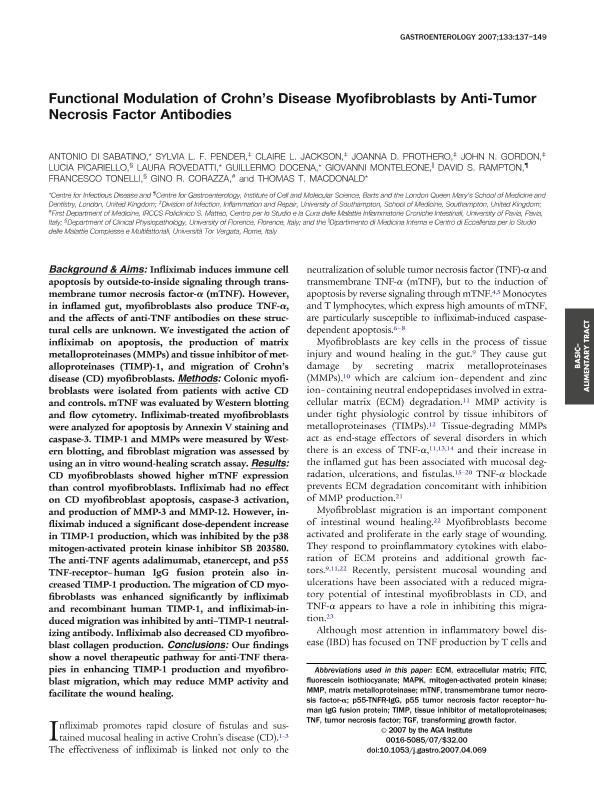Artículo
Functional Modulation of Crohn’s Disease Myofibroblasts by Anti-Tumor Necrosis Factor Antibodies
Di Sabatino, Antonio; Pender, Sylvia L.F.; Jackson, Claire L.; Prothero, Joanna D.; Gordon, John N.; Picariello, Lucia; Rovedatti, Laura; Docena, Guillermo H. ; Monteleone, Giovanni; Rampton, David S.; Tonelli, Francesco; Corazza, Gino R.; MacDonald, Thomas T.
; Monteleone, Giovanni; Rampton, David S.; Tonelli, Francesco; Corazza, Gino R.; MacDonald, Thomas T.
 ; Monteleone, Giovanni; Rampton, David S.; Tonelli, Francesco; Corazza, Gino R.; MacDonald, Thomas T.
; Monteleone, Giovanni; Rampton, David S.; Tonelli, Francesco; Corazza, Gino R.; MacDonald, Thomas T.
Fecha de publicación:
07/2007
Editorial:
W B Saunders Co-Elsevier Inc
Revista:
Gastroenterology
ISSN:
0016-5085
e-ISSN:
1528-0012
Idioma:
Inglés
Tipo de recurso:
Artículo publicado
Clasificación temática:
Resumen
Infliximab induces immune cell apoptosis by outside-to-inside signaling through transmembrane tumor necrosis factor-α (mTNF). However, in inflamed gut, myofibroblasts also produce TNF-α, and the affects of anti-TNF antibodies on these structural cells are unknown. We investigated the action of infliximab on apoptosis, the production of matrix metalloproteinases (MMPs) and tissue inhibitor of metalloproteinases (TIMP)-1, and migration of Crohn’s disease (CD) myofibroblasts. Methods: Colonic myofibroblasts were isolated from patients with active CD and controls. mTNF was evaluated by Western blotting and flow cytometry. Infliximab-treated myofibroblasts were analyzed for apoptosis by Annexin V staining and caspase-3. TIMP-1 and MMPs were measured by Western blotting, and fibroblast migration was assessed by using an in vitro wound-healing scratch assay. Results: CD myofibroblasts showed higher mTNF expression than control myofibroblasts. Infliximab had no effect on CD myofibroblast apoptosis, caspase-3 activation, and production of MMP-3 and MMP-12. However, infliximab induced a significant dose-dependent increase in TIMP-1 production, which was inhibited by the p38 mitogen-activated protein kinase inhibitor SB 203580. The anti-TNF agents adalimumab, etanercept, and p55 TNF-receptor–human IgG fusion protein also increased TIMP-1 production. The migration of CD myofibroblasts was enhanced significantly by infliximab and recombinant human TIMP-1, and infliximab-induced migration was inhibited by anti–TIMP-1 neutralizing antibody. Infliximab also decreased CD myofibroblast collagen production. Conclusions: Our findings show a novel therapeutic pathway for anti-TNF therapies in enhancing TIMP-1 production and myofibroblast migration, which may reduce MMP activity and facilitate the wound healing.
Palabras clave:
IBD
,
TNF
,
INFLIXIMAB
,
MYOFIBROBLAST
Archivos asociados
Licencia
Identificadores
Colecciones
Articulos(CIDCA)
Articulos de CENTRO DE INV EN CRIOTECNOLOGIA DE ALIMENTOS (I)
Articulos de CENTRO DE INV EN CRIOTECNOLOGIA DE ALIMENTOS (I)
Citación
Di Sabatino, Antonio; Pender, Sylvia L.F.; Jackson, Claire L.; Prothero, Joanna D.; Gordon, John N.; et al.; Functional Modulation of Crohn’s Disease Myofibroblasts by Anti-Tumor Necrosis Factor Antibodies; W B Saunders Co-Elsevier Inc; Gastroenterology; 133; 1; 7-2007; 137-149
Compartir
Altmétricas



